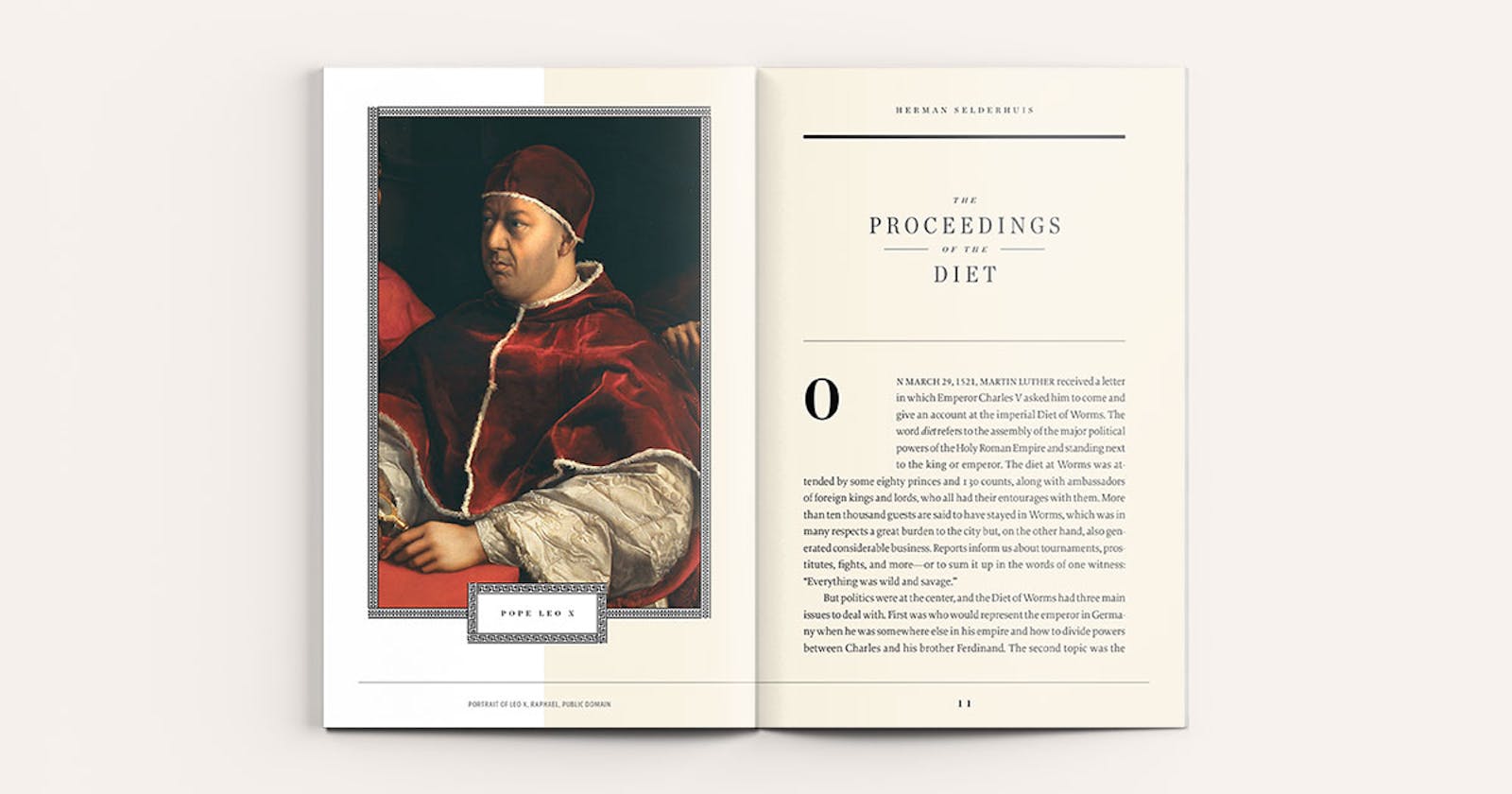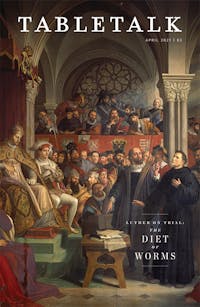
Request your free, three-month trial to Tabletalk magazine. You’ll receive the print issue monthly and gain immediate digital access to decades of archives. This trial is risk-free. No credit card required.
Try Tabletalk NowAlready receive Tabletalk magazine every month?
Verify your email address to gain unlimited access.
On March 29, 1521, Martin Luther received a letter in which Emperor Charles V asked him to come and give an account at the imperial Diet of Worms. The word diet refers to the assembly of the major political powers of the Holy Roman Empire and standing next to the king or emperor. The diet at Worms was attended by some eighty princes and 130 counts, along with ambassadors of foreign kings and lords, who all had their entourages with them. More than ten thousand guests are said to have stayed in Worms, which was in many respects a great burden to the city but, on the other hand, also generated considerable business. Reports inform us about tournaments, prostitutes, fights, and more—or to sum it up in the words of one witness: “Everything was wild and savage.”
But politics were at the center, and the Diet of Worms had three main issues to deal with. First was who would represent the emperor in Germany when he was somewhere else in his empire and how to divide powers between Charles and his brother Ferdinand. The second topic was the question of taxes to finance the empire, and the third issue was the complaints from the German-speaking world against the pope and the curia (church administrators) in Rome.
Originally, the Luther issue had not been put on the agenda of the diet. Only at the last moment was the causa Lutheri added, and that against the wishes of the clergy. At the end of 1520, the pope had issued the ban on Luther, which meant he was excommunicated from the church, and the clergy now hoped that this excommunication would simply be endorsed by the diet, making a hearing redundant and isolating Luther socially and politically. Frederick the Wise, elector of Saxony and Luther’s political authority, managed to convince the emperor that Luther should be invited to give an account. The emperor felt compelled to accommodate this request because he realized that an increasingly large number of people had joined Luther, including many political rulers. Nevertheless, the invitation from the emperor lacked clarity as to why Luther should come to Worms. Was it to recant? Was it to explain? The emperor kept the door open to both the pope and the rulers. Luther himself clearly understood that the journey to Worms was dangerous, but he wanted to go nevertheless.
Luther departed on April 2 for Worms. He was accompanied by the Augustinian friar Johannes Petzenstein, the theologian Nicolaus von Amsdorf, the jurist Justus Jonas, and the nobleman Peter von Suaven, a representative from the students. The Reformer was determined to go to Worms and even maintained that a sickness would not prevent him from appearing before the emperor. Nevertheless, he dreaded it. Constantly he thought of Jan Hus, who, like Luther, was promised safe conduct but ended up being burned at the stake in Constance.
the journey
The causa Lutheri had become one of the most important political issues in Europe. For many in Germany, Luther had become a hero, and for everyone, he was a spectacle. On his journey to Worms, everywhere people were standing along the road. In some places he was hailed, and in others city authorities tried so hard to ignore him that the interest only increased. In Leipzig, no one paid him any attention, but in Erfurt it was a completely different story. The rector of the university, Crotus Rubeanus, met Luther outside the city with forty knights to lead him into the city in a stately and formal fashion. The next morning, when he preached in the Augustinian church, it was so full that people panicked; several who were sitting upstairs broke the windows to get out more quickly. Luther calmed the people and blamed the devil for the panic.
Along the way, Luther was anxious with fear and trepidation. He became so sick that they resorted to bloodletting. His intestinal issues, long a nuisance, plagued him again.
On April 14, they arrived in Frankfurt, and the next day they went to Worms. Luther trusted that he “would enter Worms also against the will of all the gates of hell and the powers of the air.” Instead, he first heard a trumpet sound. When Luther and his companions approached the city gates on April 16, trumpets from the church tower announced his arrival. In front of the city gate, a delegation of the Saxon nobility waited to lead him to the place where he would be staying. Along the streets, approximately two thousand people greeted him loudly, much to the annoyance of the papal delegation. Pictures of Luther sold so well that printers could not meet demand. People wanted to touch him, as if he were an image of the saints or a relic.

Luther was lodged at the Johanniterhof, where part of the Saxon delegation lived. Because of the imperial diet, the town lacked sufficient accommodations for all the travelers, and Luther had to share his room with two others. Almost immediately, he was visited by several rulers, such as the young Philip of Hesse (1504–67), who would become quite important for the cause of the Reformation. On the morning of April 17, Luther was informed that at four o’clock in the afternoon he was expected at the palace of the bishop near the church tower, where he would appear before the emperor. He was told no more, because at that time it was still not clear how they were going to deal with this point on the imperial agenda. He hoped that he would at least have an opportunity to explain his vision about justification and discuss the points of disagreement.
the hearing
One of the emperor’s chamberlains picked up Luther at noon. Because the streets were full of people who wanted to see him, he was led via small gardens and alleyways to the emperor. The beginning was awkward; Luther entered with a cheerful expression but soon realized that such behavior contravened protocols for being in the presence of the emperor. Luther was also surprised when Johann Eck, who was actually in service to the archbishop of Trier but spoke here on behalf of the emperor, indicated a collection of writings on a table and asked if they were all his. Luther requested that they be named one by one. When that was done, he acknowledged that he had indeed written them. Immediately, he was asked to retract them. Luther requested time to give this demand consideration, “because it concerns God’s Word, and that is after all the highest in heaven and earth.” Luther did not want to fall under the judgment of Christ, “who said that whoever is ashamed of me on earth, I will be ashamed of him before my heavenly Father and his angels.”
When he stood before the emperor and appeared to have some doubt, his request for some time to reflect was not surprising. He was standing before the most powerful man in the world, who was surrounded by a large group of powerful people from both the church and the empire. The emperor had just made it clear that for Luther’s own health, for that of the entire church, and for that of the whole empire, it would be better if Luther would quickly recant and then act normally again. In response to his request for time for reflection, Eck told Luther that he did not have the right to make such a request, because he should have known in advance that he was called here to recant. But the emperor wanted to be merciful and granted him time for reflection until the next day at noon.
Luther left immediately and heard from supporters that his performance had not been impressive. It had been difficult to hear him, and he had not shown a strong defense. When he returned to the inn after his first hearing, toward late afternoon, he wrote a letter, which was as much as he could do since so many people wanted to see and talk to him.
Fortunately, that evening several people dropped in to encourage him for the next day. That day would be a decisive one in Luther’s life and in the history of the Christian church.
Editor’s Note: Portions of this article are adapted or taken from Martin Luther: A Spiritual Biography by Herman Selderhuis © 2017. Used by permission of Crossway, a publishing ministry of Good News Publishers, Wheaton, IL 60187, www.crossway.org.
